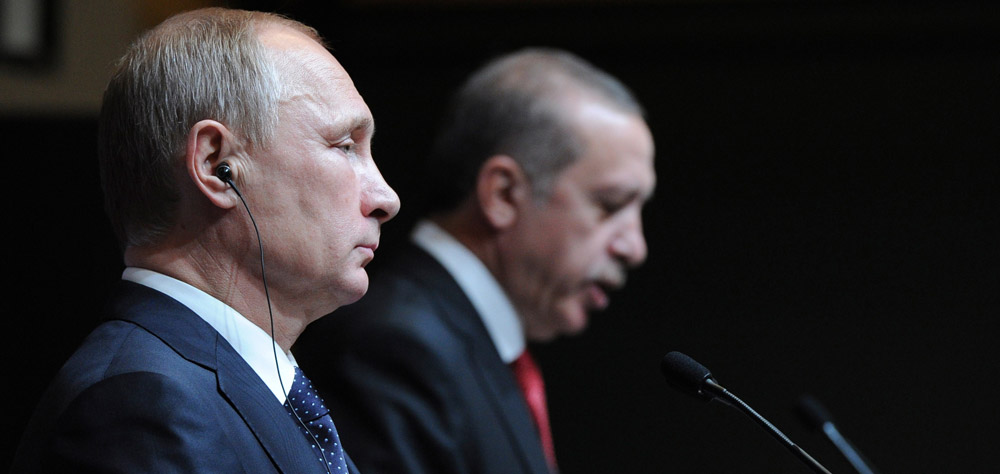(AhlulBayt News Agency) - Shift in Turkey's approach towards Syrian crisis and moving close to Russia still presents topics for analysis and news of many regional and international media. Regardless of the regional and international results of such a turnabout in Turkey's policies, what is important is to see that what factors and cases have led to Turkish closeness to Russia and on the other side Russia's willingness to restore ties with Turkey.
They earlier came heavily to blows because of their conflict of interests in Syria and of course because the Turkish fighter jets shot down a Russian bomber SU-24 over Syria close to the Turkish border in November 2015. But aside from the Syrian case, other factors have been involved in Russian-Turkish relations and the reasons behind first their diplomatic chill and then their thaw. Some of these factors are unchanging while others are subject to changes as they are influenced by different developments. In the current conditions, among the noticeably fixed and changing factors that are influential in the two countries' ties the following are important:
Factors affecting Turkish view of Russia
- In the Turkish strategic mindset, the Russians have always stood as an essential threat.
- In Turkey’s security perception, Ankara regards it power as tied to the West, and once the West shifts policy, Turkey will eye new policies including moving closer to Russia.
- Being erosive, the West Asian crises have begun to pose direct threats to the Turkish borders, especially from the Kurdish side. This triggers Ankara to resort to friendship with Moscow in a bid to push the dangers away from its borders.
- The Turks have just figured out that they have fallen puppet to the Western policy in the Syrian crisis, and now they are driven out of the game as actors.
- Ankara has come up with the notion that in the Syrian military situation there is no such obvious thing as a coalition, which means no actor on the ground can be trusted.
- Russia and Turkey need each other in an array of different cases.
With these suppositions in mind, we can make sure that although Turkey will not fully play in a Russian game, it at the same time and like in the past will not restore its ties with the West. Adopting an all-new strategy, Ankara will embark on a multi-sided strategy and certainly one of the main partners to Turkey will be Russia.
Factors affecting Russian view of Turkey
- Russia needs Turkey's help and company in an array of fields, including energy, tourism, transit, and the regional and international cases.
- The Russians are very sensitive to the pan-Turkist tendencies of Ankara, and definitely grow concerns about their expansion.
- The Azerbaijan-Georgia-Turkey alliance is highly risky for Russia.
- The Turkish membership of NATO is viewed by Moscow as a potential threat.
- The Russians are seeking use of the Turkish influence and capacity to settle the West Asian crises.
- The more Turkey moves away from the West, the more this will work for the Russian interests.
With consideration of a mix of these factors, it can be suggested that Moscow views Ankara as a threat while simultaneously sees it as an opportunity. So it regulates its ties with Ankara based on tactics not fixed strategies, and when the need arises Russia uses instruments such as the energy, Kurds, and economy to put strains on Turkey.
Therefore, the Russian-Turkish relations are subject to a set of variables that can directly shape them. But even more important issue is their geopolitical and strategic circumstances which make them decline to establish their relations on a full alliance or a full enmity. This situation pushes Ankara and Moscow to make their decisions on their future ties under influence of some interests and threats. This was glaringly apparent in the Syrian case. But without doubt continuation of these conditions will depend on the upcoming developments and the two countries' tactical and strategic approach to such developments.
/298
source : Alwaght
Saturday
28 January 2017
6:16:28 AM
807735

Shift in Turkey's approach towards Syrian crisis and moving close to Russia still presents topics for analysis and news of many regional and international media.
